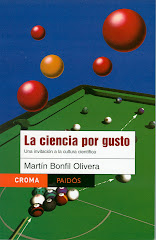by Martín Bonfil OliveraPublished on Milenio Diario, April 15, 2009
 Wisely, when many philosophies seem to seek its disappearance, my fellow columnist on Milenio Diario newspaper Braulio Peralta says, last Monday "Hurray for the self"!, since, whatever his followers say, "Buda could be nothing but his own self".
Wisely, when many philosophies seem to seek its disappearance, my fellow columnist on Milenio Diario newspaper Braulio Peralta says, last Monday "Hurray for the self"!, since, whatever his followers say, "Buda could be nothing but his own self". "With a self", Braulio says, corruption, for example, can be fought. If we deny it, it becomes impossible to defend "honesty, ethics, human rights".
The question of the self has fascinating facets also from the scientific point of view. How can a brain made of cells, in turn made of molecules, originate the subjective sensation that allows Descartes, and all of us ith him, to say "I think, therefore I am"? How can a material mass of tissue generate consciousness, a sensation of self, a soul?
The easiest answer is the dualist one: to suppose that something external, a soul or spirit, "enters" the brain and animates it. The brain is only the vehicle; the soul is immaterial and, since we're at it, immortal. Sounds nice.
The alternative, known as materialism, monism or naturalism, is more sensible, but has problems. One can explain how sensory stimuli are processed in a very complex way, in parallel, by different brain systems. But the problem really starts when explaining to whom the result of all of this processing is presented, giving us our subjective experience of the reality that surround us.
To postulate a "homunculus" that lives inside the brain is a return to dualism. Philosopher Daniel Dennett - whom I have mentioned a lot lately - proposes a stimulanting explanation in his book Consciousness explained: consciousness, the self, is a virtual phenomenon. It is not material, nor spiritual: it’s a consequence of the working of the brain that emerges in a superior level of organization. (Life is another example of an emerging phenomenon: it only exist in and above the cell level, not in atoms).
In some level of this processing, the brain starts to perceive itself, and that gives rise to the - virtual - sensation of conscience.
Sounds complex, but trying to understand the self, as difficult it may seen, will always be better - and more useful - that to deny it or to renounce to explain it. "Long live the self; and long live the naturalized soul!
(translated by Adrián Robles Benavides)
To receive Science for pleasure weekly
in your email, subscribe here!
 Wisely, when many philosophies seem to seek its disappearance, my fellow columnist on Milenio Diario newspaper Braulio Peralta says, last Monday "Hurray for the self"!, since, whatever his followers say, "Buda could be nothing but his own self".
Wisely, when many philosophies seem to seek its disappearance, my fellow columnist on Milenio Diario newspaper Braulio Peralta says, last Monday "Hurray for the self"!, since, whatever his followers say, "Buda could be nothing but his own self".



No comments:
Post a Comment